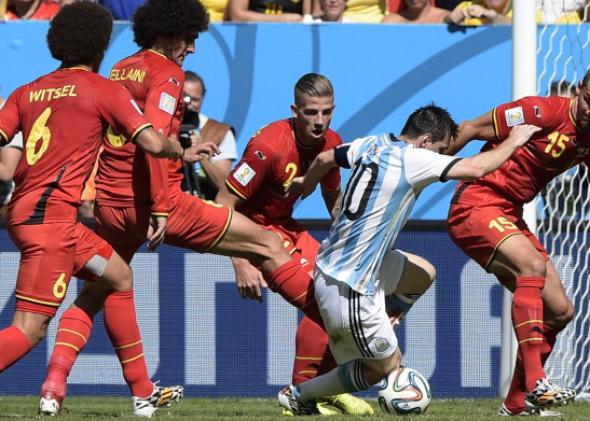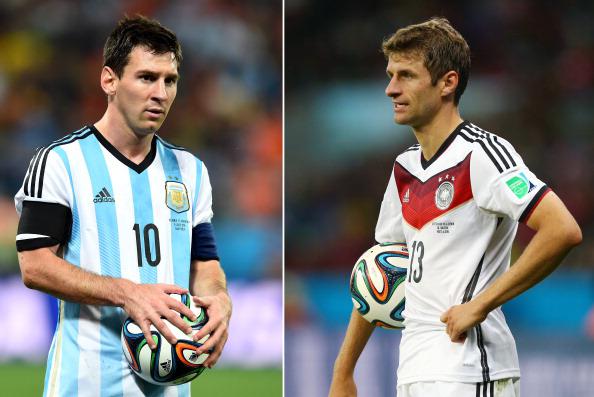Lionel Messi is great. Germany is great. There should be no debate about either of these things. And yet, in the minds of many, Sunday’s World Cup final will answer a pair of questions that nobody should bother to ask: Can Messi truly be a legend if he’s missing a “signature World Cup moment”? And is this German national team, the one that crushed a reeling Brazil, really all that great?
Let’s begin with Messi.
“It would be beautiful to be five seconds him.”
It’s not notable that someone would say such a thing about the greatest player in soccer. It is notable that the words came from Messi’s Argentina teammate Javier Mascherano.
Mascherano has been the defensive anchor of an Argentine team that conceded just three goals on its way to the World Cup final. Much more so than Messi, the holding midfielder was the hero of Argentina’s semifinal victory over the Netherlands—he made the brilliant tournament-saving, anus-tearing tackle that prevented Arjen Robben from scoring the game-winner in the dying minutes.
It wasn’t just that amazing, beautiful, perfect tackle. Mascherano is one of the finalists for the “Golden Ball” award, the tournament’s MVP trophy. He has more recovered balls than any of the other finalists, including vaunted German defenders Philipp Lahm and Mats Hummels. He’s fifth in the tournament in blocked shots, fifth in interceptions, and No. 1 in total passes.
And this is not Mascherano’s first rodeo. He has been a regular starter as Messi’s teammate at Barcelona, including on the 2010-2011 team that was one of the greatest club sides in history. He has also won two Olympic gold medals with Argentina.
Keep all of that in mind when you hear that Mascherano, in a new docudrama about Messi’s life, says that it would be a beautiful thing to experience the game through Messi’s eyes for a few moments. It’s as if Scottie Pippen sang “Be Like Mike” in a Gatorade commercial.
None of this is to say that Mascherano is some kind of lackey for Messi. He’s not. It’s just to emphasize the esteem that Messi’s otherworldly talents inspire, especially among his teammates.
Messi’s achievements have proven worthy of such admiration. His genius and vision on the pitch are undeniable. At the World Cup he has been the focal point of every game he’s played. He’s scored, assisted, or otherwise set up seven out of Argentina’s eight goals. He’s also forced teams to alter their game plans to neutralize him. In Argentina’s group stage opener at the Maracanã, the site of Sunday’s final, Messi caused the opening own-goal by Bosnia-Herzegovina with a dangerous free kick into the box. He then scored the game-winner with a stunning run through the Bosnian defense.
In the next match, he saved Argentina from an embarrassing 0-0 draw with Iran by scoring in injury time with one of the best goals of this World Cup.
In the next match against Nigeria, he scored a brace that ensured that Argentina would finish top of the group and avoid facing France and Germany in the first two knockout rounds and instead play the much tamer Switzerland and Belgium. Against the Swiss, he made another game-changing run in the 118th minute before laying it off to Ángel di María for the match-winning score. In Argentina’s 1-0 victory over Belgium in the quarterfinals, it was again Messi who created the space for the team’s only goal by dancing around two defenders before finding Ángel di María, who ultimately set up the Gonzalo Higuaín score.
Belgium, who as a reminder had taken 38 shots and 27 on target in the previous game, was held scoreless on 10 attempts against Argentina. A lot of this was due to Mascherano’s leadership and the cohesiveness of the team defensively, but Belgium was also forced to alter its tactics to try to cope with Messi. I’ve heard one commentator describe Messi’s role in these latter rounds as that of a sort of nuclear deterrent, offsetting an opponent’s ability to focus resources on attack because of fear that he’ll go off.
No single player has had a bigger impact on his team at this World Cup. And that’s just this tournament. Messi’s prior C.V. includes six Spanish league titles, three Champions League trophies, an Olympic gold medal, and a record four Ballon d’Or trophies. He also has the records for most goals scored in a single year with 91 and most consecutive games with a goal (21 matches and 33 goals for Barca in the 2012-2013 season), and he has the second-most goals in the history of Argentina’s national team (a record he’s on pace to break).
Yet, there still seems to be a question in the sports press of whether Messi deserves to be placed alongside Brazil’s Pele and Argentine countryman Diego Maradona as one of the greatest players of all time. Whatever happens in Sunday’s final is supposed to determine the legacy of a player who has already achieved more on a soccer field than perhaps anyone else ever. He’s supposed to lead his team to victory over a German side that is clearly the best in the world. He’s supposed to do it having played 30 more minutes than the Germans, feeling “like his legs weighed 100 kilos” each, and on one day fewer rest. And he’s supposed to do it against a team that already has a “secret plan” to modify its tactics, as the Belgians and the Dutch have done, to hold him in check.

Juan Mabromata / AFP/Getty Images
Germany is facing an identical dilemma as Messi. The Germans are the best team in the world right now. They confirmed that with a victory over Brazil that will be remembered by soccer fans and history books as long as the sport exists. But if they lose against Messi, then they’ll go down as losers.
In reality, this German national team has already earned its place as one of the best in history. ESPN’s Soccer Power Index has them listed at No. 1 in the world, which isn’t that surprising. More impressive is that the World Football Elo Ratings—touted by Neil Paine and Nate Silver of 538.com, who declare themselves “big fans” of that rating system—rank this German team as the best in history.
If you look at the list, it’s astonishing to see them ahead of Ferenc Puskás’ 1954 Hungary team, Pele’s 1962 Brazil team, and Spain’s 2013 team that was coming off of its third consecutive major title at Euro 2012. You could look at Germany’s placement ahead of those teams and think, “that’s kind of stupid,” or at least “that’s kind of premature.” You might be right. But it should give you an appreciation for what Germany has accomplished in recent years.
This German team has been the second-most-consistent team to Spain since 2006. They finished third at the 2006 World Cup, runners-up to Spain at Euro 2008, third again at the 2010 World Cup, and as semifinalists at Euro 2012. They will finish either first or second at this World Cup, and their rating has already gotten a major bump from beating Brazil 7-1 in Brazil. That’s probably the most impressive result in the history of the sport when you consider that the Brazilians hadn’t lost a competitive home match since 1975.
And this golden generation of Germans has already achieved great things aside from rankings. The team is built from the side that won the 2009 European Under-21 Championship. Twenty-eight-year-old Manuel Neuer has been the goalkeeper of the tournament (sorry Tim Howard), while the team’s young, ultra-talented midfield has been the principal reason for its success.* Twenty-four-year-old Thomas Müller has five goals for the second consecutive World Cup. Twenty-five-year-old Mats Hummels scored the game-winner in the quarterfinals against France for his second goal of the tournament. Sami Khedira, the captain of that 2009 team, has been the guiding force of that midfield along with 24-year-old Toni Kroos (not a member of the 2009 German U21 team).
All of these young stars are bolstered by three all-time greats from the 2006 World Cup team that finished third at home. Philipp Lahm has been the team’s defensive guide since returning to his natural position at right back after the team struggled to get past Algeria 2-1 in a last 16 match that required extra time. Bastian Schweinsteiger has been a stalwart in midfield, while Miroslav Klose has merely gone and broken the all-time World Cup goal scoring record. When people describe this as the most-talented team in German history, that’s a reasonable claim. As a reminder, this is a nation that has won three World Cups and is entering its eighth final.
This German team also has one of the great national club sides of the era at its core. Like Spain’s 2010 starting 11, which featured a majority of Barcelona players, more than half of Germany’s starters come from another Pep Guardiola-coached side in Bayern Munich. Those players won this year’s Bundesliga crown in record speed. The 2012-13 Bayern team, coached by Jupp Heynckes, also tied the record for most wins in a Bundesliga season and won a treble with the Champions League title and the DFB-Pokal crown.
Finally, at this tournament the team has six players in the top 10 of total passes, four of the 10 finalists for FIFA’s Golden Ball award, and one of the three finalists for the Golden Glove goalkeeping award. Oh, and 7-1.
But none of this will be enough to ensure Germany’s reputation as one of the great teams of all-time. To do that, they have to beat the sport’s Michael Jordan. If they don’t, then they’ll be considered a pretty good team that just didn’t have enough, like the Utah Jazz.
It’s just one game, and hopefully it will be a great one, full of Messi moments and German brilliance. But only one side can win. And the victor is supposed to decide the “greatness” of Germany and of Messi forever and ever?
This German team is at worst the second-best team of the past decade and one of the top international teams in recent history. Messi is the greatest player of his generation and one of the best of all-time. The result of Sunday’s World Cup final won’t change those two facts. Unless somebody wins 7-1.
*Correction, July 14, 2014: This post originally misstated Manuel Neuer’s age. He is 28 years old, not 23.
